HackUTD’18 Inspires Student Creativity and Innovation for a Fourth Year
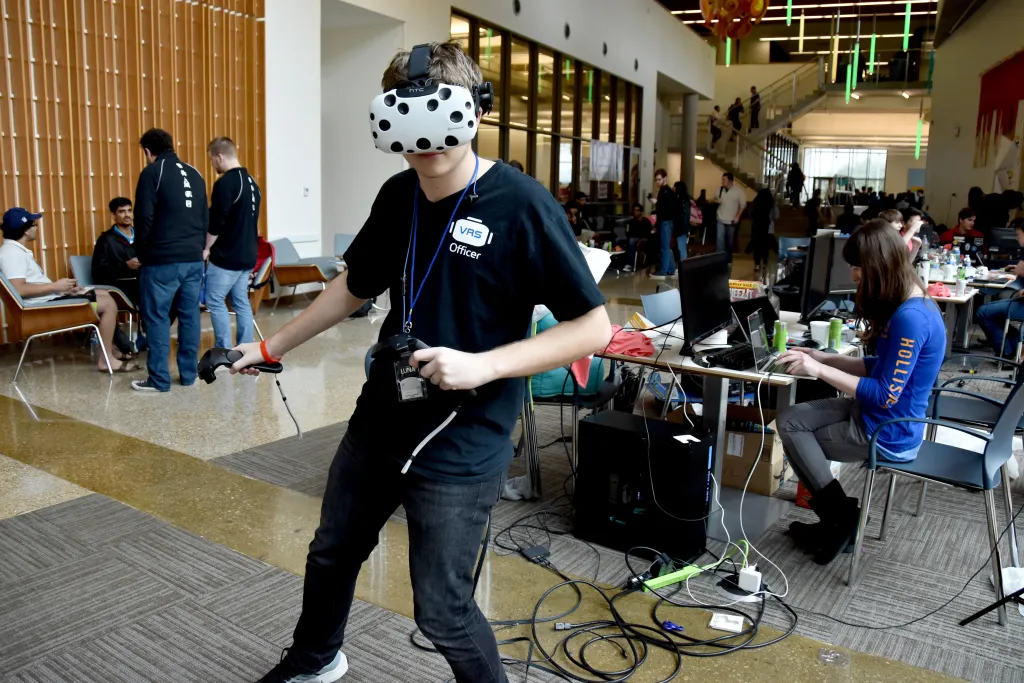
Last spring, more than 550 college students from all over Texas formed teams for HackUTD’18, a 24-hour Hackathon organized and run by the UT Dallas Student Chapter of the ACM (Association for Computer Machinery) in partnership with Major League Hacking. Students were challenged to use technology to create, design and develop an original product utilizing their knowledge and skills that they have accumulated over the years. HackUTD’18 was organized under the guidance of UT Dallas CS Professor, John Cole. This year’s projects included an augmented reality multiplayer pirate ship combat game, a web application that utilizes machine learning to score user’s social media posts, a robotic arm that is controlled in real-time via web socket using the Oculus Rift Touch controllers, mimicking real-life movement, and a meme-oriented programming language.
As the only major collegiate hackathon hosted in the Dallas/Fort Worth area, HackUTD has become the largest university hackathon in North Texas, attracting the very best students not only from Texas but from around the nation, as well as bringing in big-time tech sponsors such as Elevate, Wolters Kluwer, State Farm, Match.com, Cisco, Big Design USA, and Lone Wolf Technologies to interact with the students. In addition, HackUTD’18 also partnered with Major League Hacking (MLH), UT Dallas MakerSpace, the UT Dallas Computer Science Department, and student organizations including the UT Dallas Virtual Reality Society and the Blockchain And Cryptographic Systems.
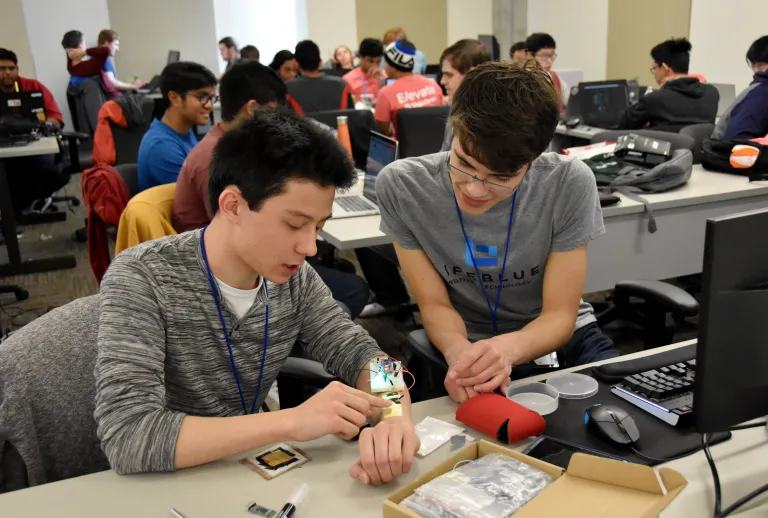
Students were able to compete in various tracks including mobile, design, hardware, finance, blockchain, startup, and sports. In addition to traditional prizes for top projects, sponsors challenged students to compete in their tracks such as State Farm’s track, which asked participants to create an application that could be used at elementary and middle schools or STEM camps to teach students about the creative aspect involved in software development and basic coding principles.
One of the significant elements of HackUTD was the interaction between the students, sponsors, and industry mentors. In between coding their apps, attendees were free and encouraged to network with company representatives and get assistance on projects from mentors. During the 24-hour event, students were offered the option to attend various tech talks hosted by the event sponsors, to gain insight into the role of technology in their industry.
The students officially began working on their respective projects at noon, Saturday, following registration and opening ceremonies. Many hackers stayed awake for the full 24 hours to finish their projects, and by the end of the 24 hours, at noon on Sunday, students were able to submit their final projects for judging. The projects were judged on the basis of uniqueness, technicality, viability, UI & UX design, complexity, and impact factor. Prizes for the awards totaled $9,300. Tech industry members and sponsors were amongst the judges.
The following are brief descriptions of first, second, and third place winning projects of HackUTD’18:
1st Place: Robot-Arm-Controller – IoT Robotic Arm is controlled in real-time via web socket using the Oculus Rift Touch controllers, mimicking real-life movement.
2nd Place: ARrrr – A augmented reality multiplayer pirate ship combatting game. ARrrr connects three players together in an augmented reality combat arena where they battle it out for supremacy of the seas. It is a fast-paced, competitive multiplayer game where quick maneuvering and shrewd use of your ship’s broadside cannons are required to prevail over your opponents.
3rd Place: Social Credit – A web app which utilizes machine learning to score a user’s social media posts. Social Credit helps lenders get an insight into the trustworthiness of potential borrowers based on their social media. The app is an interface for the borrower to provide access to their social media posts. After evaluating their posts using sentiment analysis, a score is given that shows their “goodness score.”
Additional Awards in subcategories were presented as well, these include:
Design: Score – Score is a native iOS application that provides individuals with a holistic “risk score” from aggregated demographic, financial, health, social, and professional data. The goal is for the score to inform and enable a better lifestyle — from exercise and nutrition to social media behavior to spending habits.
Hardware: Robot-Arm-Controller – IoT Robotic Arm is controlled in real-time via web socket using the Oculus Rift Touch controllers, mimicking real-life movement.
Mobile: ARrrr – A augmented reality multiplayer pirate ship combatting game.
Cisco: Hang | Time – A web app that uses crowdsourcing to create a social map of local events.
State Farm: Dank – A meme-oriented programming language.
Elevate Blockchain: Loany – Loany is a blockchain-based Peer to Peer loaning system. Loany aims to allow people to more easily invest in the loan market and experience the 2008 financial crisis from a first-hand perspective.
Elevate AI: BAM – BAM (Blockchain Asset Manager) is an identity-based ledger that allows users to inventory, transfer, and lock assets. The team was inspired to make this ledger due to the need to transfer, loan and lease assets quicker and easier using the blockchain.
To view all the HackUTD’18 submissions, click here.
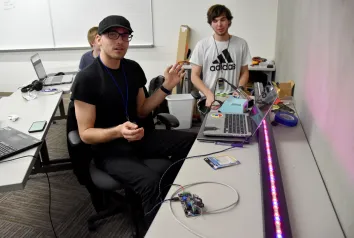
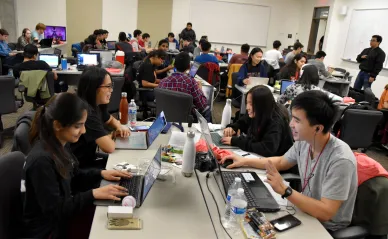
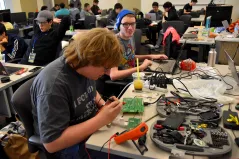
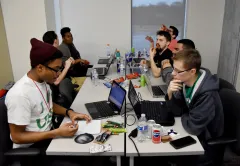
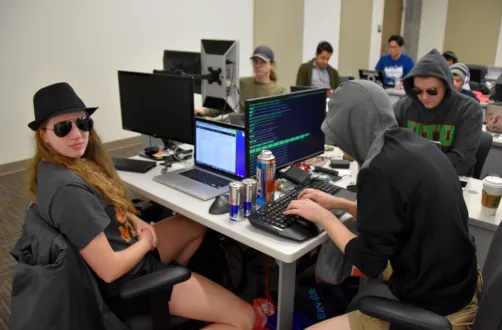
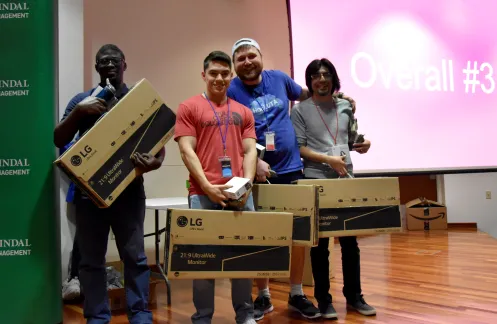
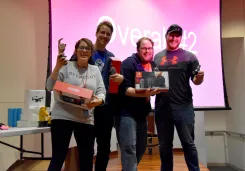
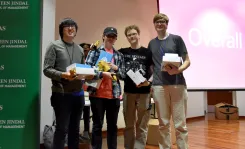
ABOUT THE UT DALLAS COMPUTER SCIENCE DEPARTMENT
The UT Dallas Computer Science program is one of the largest Computer Science departments in the United States with over 2,400 bachelors-degree students, more than 1,000 master’s students, 150 Ph.D. students, 53 tenure-track faculty members and 38 full-time senior lecturers, as of Fall 2017. With The University of Texas at Dallas’ unique history of starting as a graduate institution first, the CS Department is built on a legacy of valuing innovative research and providing advanced training for software engineers and computer scientists




